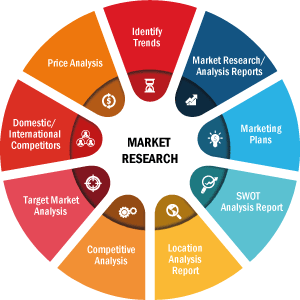According to our new research study on "Synthetic Biology Market Forecast to 2028 – COVID-19 Impact and Global Analysis – by Products (Enzymes, Chassis Organisms, Oligonucleotides, and Xeno-Nucleic Acids), Technology (Measurement & Modeling, Cloning & Sequencing, Genome Engineering, Gene Synthesis, Nanotechnology, and Others), and Application (Medical Applications, Industrial Applications, Food and Agriculture, Environmental Applications, and Others), the market is expected to reach US$ 37,850.85 million by 2028 from US$ 10,544.16 million in 2021; it is estimated to grow at a CAGR of 20.0% during 2021–2028.
Key factors driving the market's growth are increasing investments in synthetic biology and the rising number of start-ups in the market. However, the renewed regulations for biotechnology hamper the market growth. The report highlights the key factors driving the market and prominent players' developments. With rising investments by companies, the demand for synthetic biology-based new techniques is increasing, thereby driving the synthetic biology market growth.
Synthetic Biology Market
Synthetic Biology Market Size and Forecast (2021 - 2031), Global and Regional Share, Trend, and Growth Opportunity Analysis Report Coverage: By Products (Enzymes, Chassis Organisms, Oligonucleotides, Xeno-Nucleic Acids); By Technology (Measurement & Modeling, Cloning & Sequencing, Genome Engineering, Gene Synthesis, Nanotechnology, Others); and by Application (Medical Applications, Industrial Applications, Food and Agriculture, Environmental Applications, Others), and Geography
Synthetic Biology Market Key Findings by 2031
Download Free Sample
COVID-19 Pandemic Impact on Synthetic Biology Market
The global healthcare system was severely challenged by an explosive surge of COVID-19 positive cases, which resulted in a significant increase in the demand for medical care. The government released interim and updated guidelines for clinical management of patients with confirmed COVID-19, which included its clinical presentation, transmissions, and the clinical course of action against the disease. According to MolecularCloud, a platform sponsored by GenScript, In the fight against the current pandemic, scientists are turning to synthetic biology to hurry up the development of a vaccine. In the drug discovery pipeline, in many areas, the speed and accuracy of the latest synthetic biology tools are creating a measurable distinction within the ability to accelerate drug development while at the same time reducing expenses.
Synthetic biology can contribute to drug and vaccine development advances in pest control of invasive species. In response to the COVID-19 pandemic, synthetic biologists are applying cutting-edge tools to speed up the development of a successful vaccine. Their efforts illustrate synthetic biology's potential to design, build, and test solutions for an unanticipated challenge such as COVID-19. Additionally, in the COVID-19 pandemic, synthetic biology was viewed as the next step in the advancement of vaccination development. It was being used as a design tool to make vaccines more effective than ever. Also, the Cambridge laboratory used synthetic biology to locate a critical area of the virus's genetic code that helped to develop a vaccine ready for testing within a very short time frame. At the same time, Twist Bioscience also announced the availability of synthetic SARS-CoV-2 RNA controls to provide quality control for the development, verification, and ongoing validation of diagnostic tests. Therefore, the demand for synthetic biology services continued to grow through the COVID-19 pandemic, thereby ensuring continued growth.
The synthetic biology market majorly consists of the players such as Thermo Fisher Scientific, Agilent Technologies, Merck KGaA, New England Biolabs, Integrated DNA Technologies, Twists Bioscience, Genscript Biotech Corporation, Novozymes A/S, Codexis, and Amyris.
The report segments the synthetic biology market as follows:
The synthetic biology market is segmented based on products, technology, and application. Based on products, the synthetic biology market is segmented into enzymes, chassis organisms, oligonucleotides, and xeno-nucleic acids. Based on technology, the synthetic biology market is segregated into measurement & modeling, cloning & sequencing, genome engineering, gene synthesis, nanotechnology, and others. Based on application, the synthetic biology market is segmented into medical applications, industrial applications, food and agriculture, environmental applications, and others.
By geography, the global synthetic biology market is segmented into North America (the US, Canada, and Mexico), Europe (France, Germany, the UK, Spain, Italy, and the Rest of Europe), Asia Pacific (China, India, Japan, Australia, South Korea, and the Rest of APAC), the Middle East & Africa (Saudi Arabia, the UAE, South Africa, and the Rest of the MEA), and South & Central America (Brazil, Argentina, and the Rest of South & Central America)
Contact Us
Phone: +1-646-491-9876
Email Id: sales@theinsightpartners.com